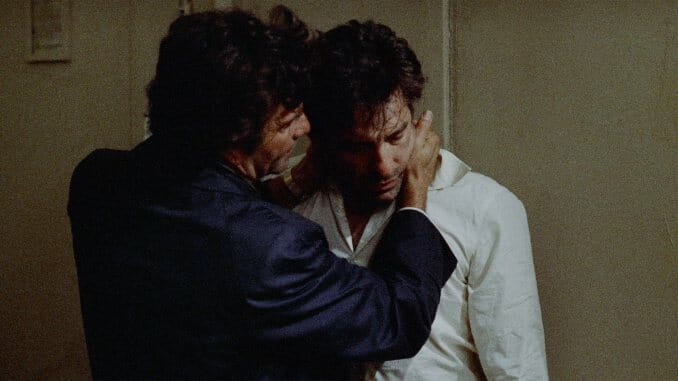Elaine May Perfected Dudes Rock Cinema 45 Years Ago with Mikey and Nicky

…don’t expect to like ‘em.
This was the tagline for Mikey and Nicky, Elaine May’s bleak 1976 examination of its titular characters (Peter Falk and John Cassavetes, respectively), played out over one fateful night in Philadelphia. Those five words were as much a promise as they were a warning to audiences who could have gone into the new film from the director of comedies A New Leaf and The Heartbreak Kid expecting a breezy time at the cinema. And yet…
Going into Mikey and Nicky without the assumption that you will, or even should, like these guys is certainly in your best interest. Over the course of this night, May captures men in all of their repugnant, self-destructive, toxic reality. At the same time, however, that’s not to say that you should expect to dislike them. As is the case with all the best characters in cinema, Mikey and Nicky are complicated—as lovable as they are loathsome.
“Mikey, I’m in trouble.”
The first words we hear Nicky speak to his childhood pal, ringing him over the phone at the start of the film, are a cry for help. Nicky, a small-time mobster, has stolen money from the boss, and there’s now a hit out on his life. Mikey heads over to the hole where his friend is hiding—we can tell right away this isn’t the first time Mikey has dropped everything to try and help Nicky out of a bad spot. After some convincing, Nicky agrees to head outside with Mikey, haphazardly attempting to plot some way out of a conclusion that seems inevitable.
May came from a family that was in some way connected to mob types, drawing from personal experience in order to paint this portrait of two guys who weren’t exactly The Godfather caliber, which would be familiar to audiences as it came out a few years prior to Mikey and Nicky’s release. Hell, these guys weren’t even at the status of the young men in Mean Streets. Mikey and Nicky were schlubs, old chewing gum stuck to the bottom of the mob world’s shoes. The difference is that Mikey knows it, while Nicky always thinks he’s better than the guy everyone else sees him as. This distinction is at the heart of their dynamic, which we learn more details about over the course of the night, as resentment built up over years comes to the surface.
These are two men living completely opposite experiences through the film, and the beauty is that we fully experience both of those POVs, often at the same time. Nicky is an anxious wreck, a ball of unfettered nerves that Mikey is trying his best to keep under control and steer in the right direction, like a mother trying to get a child to brush his teeth while he’s in the middle of a temper tantrum. Of course, the whole time Mikey knows that the only way out for Nicky is with a bullet in the gut—knowledge clearly pulling at his heart despite the partial disdain he has for his old friend.
-

-

-

-

-

-

-

-

-

-

-

-

-

-

-

-

-

-

-

-

-

-

-

-

-

-

-

-

-

-

-

-

-

-

-

-

-

-

-

-








































